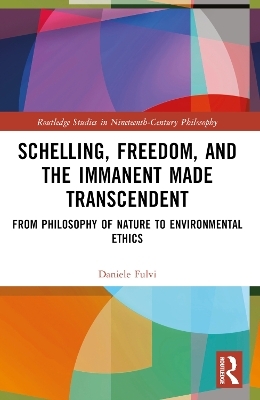
Schelling, Freedom, and the Immanent Made Transcendent
Routledge (Verlag)
978-1-032-35155-1 (ISBN)
- Lieferbar (Termin unbekannt)
- Versandkostenfrei
- Auch auf Rechnung
- Artikel merken
This book offers a cutting-edge interpretation of the philosophy of F.W.J. Schelling by critically reconsidering the interpretations of some of his “successors.” It argues that Schelling’s philosophy should be read as an ontology of immanence, highlighting its relevance for ongoing debates on ethics and freedom.
The book builds on a key notion from Schelling’s Philosophy of Revelation where he outlines the process through which transcendence must return to immanence in order to be grasped and understood. The author identifies Jaspers, Heidegger, and Deleuze as the main interpreters of Schelling’s philosophical activity, highlighting their relevance for subsequent Schelling scholarship. Heidegger and Jaspers refer to Schelling’s philosophy in negative terms, namely as an incomplete and unviable philosophical system, whereas Deleuze holds the immanent core of Schelling’s ontological discourse in high regard. The author’s analysis demonstrates that reading Schelling’s philosophy as an ontology of immanence not only avoids Heidegger’s and Jaspers’s criticisms but is also more fitting to Schelling’s original meaning. Accordingly, his reading allows us to fully grasp Schelling’s thought in all its strength and consistency: as a philosophy that avoids metaphysical abstractions and maintains the concreteness of concepts like God, nature, freedom by binding them to a solid and material account of Being. Finally, the author uses Schelling to propose an innovative reading of freedom as a matter of resistance, and of philosophy as an activity whose main purpose is that of seeking the actual extent and place of (human) life and freedom within nature. The author originally emphasises the relevance of these conclusions on contemporary debates in Postcolonial Critical Theory and Environmental Ethics.
Schelling, Freedom, and the Immanent Made Transcendent. From Philosophy of Nature to Environmental Ethics will appeal to scholars and advanced students working in 19th-century Continental philosophy, German idealism, and Postcolonial Critical Theory and Environmental Ethics.
Daniele Fulvi is a Postdoctoral Research Fellow at the Institute for Culture and Society, Western Sydney University node of the ARC Centre of Excellence in Synthetic Biology, Australia. His published work has appeared in journals such as Sophia, Critical Horizons, and Ethics, Policy and Environment.
Introduction Part 1: Transcendence of Being? 1. Schelling’s Ontological Account of Evil 2. Heidegger and Jaspers interpreters of Schelling 3. Other Transcendentist Readings: Tillich, Marcel and Pareyson Part 2: Immanence and Nature 4. Nature, Difference, and Indifference: Deleuze’s Immanentist Reading of Schelling 5. Naturalistic Interpretations of Schelling: from Merleau-Ponty to Contemporary Readings Part 3: The Legacy of Schelling’s Philosophy: From Philosophy of Nature to Postcolonial Critical Theory and Environmental Ethics 6. The Immanent Made Transcendent: Schelling’s Ontology of Immanence 7. Freedom as a Matter of Resistance: The Meaning and Foundation of Freedom in Schelling’s Philosophy 8. What Next? The Legacy of Schelling’s Philosophy in Contemporary Debates
| Erscheinungsdatum | 06.09.2023 |
|---|---|
| Reihe/Serie | Routledge Studies in Nineteenth-Century Philosophy |
| Verlagsort | London |
| Sprache | englisch |
| Maße | 152 x 229 mm |
| Themenwelt | Geisteswissenschaften ► Philosophie ► Erkenntnistheorie / Wissenschaftstheorie |
| Geisteswissenschaften ► Philosophie ► Geschichte der Philosophie | |
| Geisteswissenschaften ► Philosophie ► Philosophie der Neuzeit | |
| Geisteswissenschaften ► Sprach- / Literaturwissenschaft ► Anglistik / Amerikanistik | |
| Geisteswissenschaften ► Sprach- / Literaturwissenschaft ► Literaturwissenschaft | |
| Sozialwissenschaften | |
| ISBN-10 | 1-032-35155-1 / 1032351551 |
| ISBN-13 | 978-1-032-35155-1 / 9781032351551 |
| Zustand | Neuware |
| Informationen gemäß Produktsicherheitsverordnung (GPSR) | |
| Haben Sie eine Frage zum Produkt? |
aus dem Bereich

![Was heißt Denken?. Vorlesung Wintersemester 1951/52. [Was bedeutet das alles?] - Martin Heidegger](/media/113619842)
